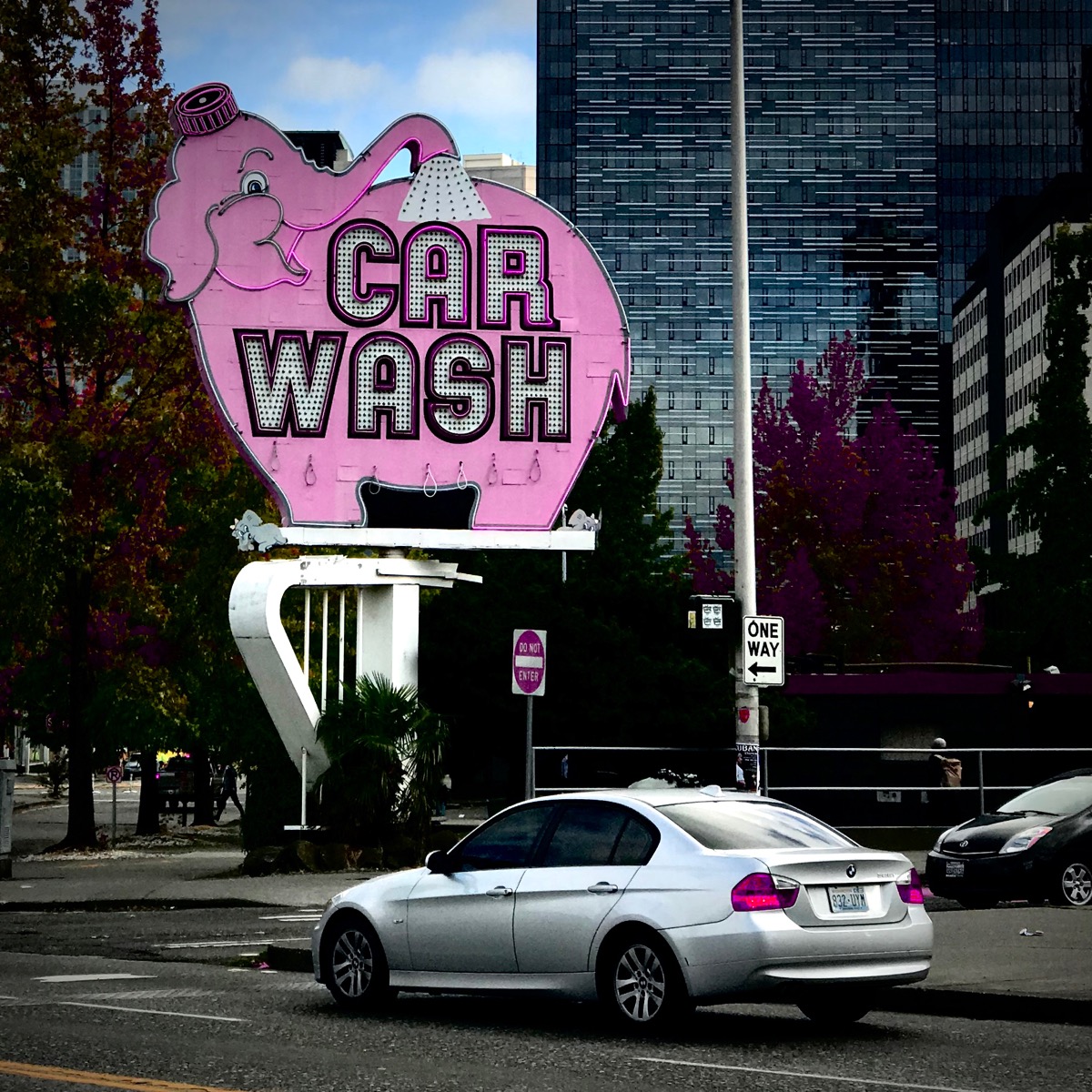Seattle Writing Prompts: Elephant Car Wash
Seattle Writing Prompts are intended to spark ideas for your writing, based on locations and stories of Seattle. Write something inspired by a prompt? Send it to us! We're looking to publish writing sparked by prompts.
Also, how are we doing? Are writing prompts useful to you? Could we be doing better? Reach out if you have ideas or feedback. We'd love to hear.

The truth is, the sign kind of eclipses the business, which is some kind of platonic capitalist ideal — it's better to draw customers than to keep them, although we all hope to do both. The business started in 1951, but the location we think of most, on Battery Street, opened in 1956. It does what it says on the tin — washes and details cars. Unlike the more modern Brown Bear franchise, Elephant sells packages that are hands on. Young men with soft cloths will buff your car and make it smell good, in that way that "air fresheners" and soapy chemicals might.
But that sign — my god, that sign. It's appeared everywhere, like there's a fine if you make a montage of Seattle without including it. As much as the Space Needle, it centers you in our city. But it also centers you in a particular time in our city. When you could drop in at Hat and Boots to get gassed up, head over to Elephant for a wash, then maybe over to Twin T-Ps for dinner. It's a certain roadside kitsch, modern America stretching her capitalist arms to the greatest generation, and setting its weird culture into the minds of those young impressionable Boomers.
Open nearly every day since the 1950s. You can imagine a number of people have come through that car wash. You can imagine all the stories that have happened.
Today's prompts
The Cadillac was spattered with mud and needed a good scrubbing, but nothing about it seemed off until they popped the trunk. Sometimes, the mud on a bumper went under the lip, and the only way to really buff it was to get under. So, someone went up and popped it, while the other fellow at the back leaned in and started cleaning. And then, reeling backward, cried out: "get the cops", before gaining his feet and retching in a waste bin.
Rainy days were slow days. Everybody knew that. But then the man in the long trench coat and over-sized fedora came in the door, a steady roll of water dripping off the front of the brim. "How man can you handle?" he said. — "Pardon, sir?" — "How many cars? How many can you do by the end of the day?" — "Uh, sir, how many you got?" — "You won't believe me if I told you," said the man. "Can you do one thousand?" — The clerk laughed, clearly this man was joking. But not only did he keep a straight face, he didn't even blink. "Uh, no, sir. I don't think we could do a thousand cars in one day." — "Fine, then. Do you know who can?"
She couldn't find her lighter in her purse, and her searching was frantic. After the man in the striped shirt offered her a light, she imagined how she looked, scarf on her head, sunglasses on even though it was overcast, digging through her bag like a mad woman, hands shaking. "Are you okay?" he asked, taking the seat next to hers, and touching her arm. She nodded, curtly, drew on her cigarette, and moved her arm away. She looked at her wristwatch — they said the car would be done by now. "Do you want to talk about it?" he said, leaning in. "Sometimes the best thing that can happen is a nice person listening very careful." — "I most certainly do not," she said, sharply. Loud enough that people around her turned to look. "Thank you for the light," she said, more reserved, and stood to cross the room, to look out the window.
Jared and Courtney competed for tips, of course, but they also compared tips at the end of the day. It was a combination of how many cars could they turn in an hour, plus how nice of a job could they do. Tips were but one way to measure it, and the competition made it go by a lot quicker. It was the two BMW wagons, one right after another, that gave them the greatest race of the day. Jared took the red one, and Courtney took the black. About half-way through, Malcolm came up to Courtney, "You know that car belongs to Jared's mom, right? You are being set up, my friend."
Every car has a story, because every person has a story and car is owned by a person. When did they buy it? Why this car? Was it a matter of money or a matter of taste? But what can you say about the man who drives an Edsel? What choice, in 1958, drove them to an Edsel instead of Chevy, or a Ford? Why would somebody look upon that heap and decide it was worth driving? And then now, who would drive that ten year old car — still in nearly perfect shape — like they were proud of it and want it washed? That was the question everybody at the car wash was asking themselves, waiting to get a glimpse of the owner when they came back to claim the car.